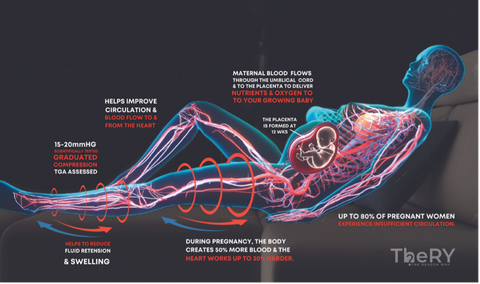3 min read
BY THERY GROUP
When going for checkups and seeing you baby in a sonogram, every mother wants to know they are doing the best for the health of their baby in utero.
You are told regularly to exercise, you are told foods to eat and foods to avoid.
But did you know feeding your baby in utero, is not just about eating healthy while you are pregnant?

It is well known that what you eat is important to ensure your developing baby gets the appropriate nutrients, there is one important factor to that affects this that is not well known. While in the womb, nutrients and oxygen need to be delivered to the baby through the umbilical cord and placenta through maternal blood flow.
Healthy blood flow for the delivery of nutrients and oxygen is of vital importance during pregnancy for the growth and development of your baby.
It is known that up to 80% of pregnant women will have circulation issues during pregnancy[1]. It is likely most women do not even know that their circulation is compromised.
During pregnancy the body creates up to 50% more blood and the heart is working up to 30% harder than usual to push blood around the body and to the growing foetus. Swollen feet, dizziness and fatigue, varicose veins are all symptoms of poor circulation.

Studies have found that if you sit for or remain sedentary for 4 hours or more a day, blood circulation can be negatively affected. This covers many people - those
- desk or office jobs sitting for most of the day
- standing all day
- babymoon road trips and long haul flights
- binging the latest series - even if you are just planning to binge watch a series on Netflix
You may need some extra help to improve circulation and ensure your maternal blood is flowing through adequately to baby.
What can you wear to help improve blood flow while pregnant?
Studies have found that wearing graduated compression [1] leggings and socks can help improve blood flow. This should be above 15mmHg. Graduated compression is engineered to gently exert pressure to the limbs.
TheRY graduated maternity compression leggings such as those from , exert a higher amount of compression at the ankle and decreases the level of compression up the leg. The constant pressure gradient helps improve venous return. TheRY compression leggings are TGA assessed and listed and are 15-20mmhg class 1 medical grade compression.

Poor circulation and deficient blood flow has negative health outcomes for both mother and baby (such as low birth weights) and should not be ignored.
If there is only one legging to wear during pregnancy it should be a TheRY graduated compression maternity legging. They can help to improve circulation and blood flow to and from the heart, important for maternal blood flow to baby. Don’t risk it and just settle for just other legging.
_________________________________________________________________
REFERENCES
[1] Cardiovascular Physiology of Pregnancy. Monika Sanghaviand John D. Rutherford; Circulation. 2014;130:1003–1008. https://doi.org/10.1161/CIRCULATIONAHA.114.009029
NOTE: Graduated compression is engineered to gently exert pressure to the limbs. Graduated compression leggings exert a higher amount of compression at the ankle and decreases the level of compression up the leg. The constant pressure gradient helps improve venous return & blood flow.
TheRY compression leggings are TGA approved and are 15-20mmhg moderate medical grade compression.

